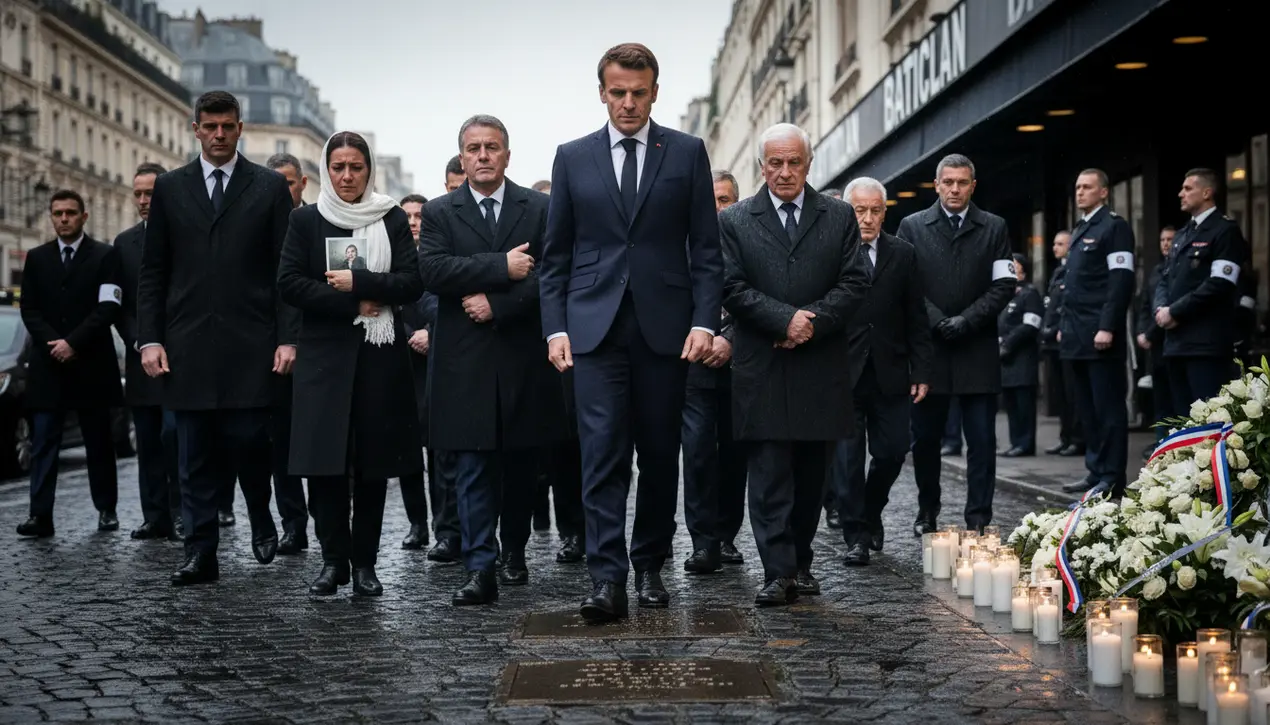
Politicsconflict & defenseTerrorism and Counterterrorism
Macron Marks Decade Since 2015 Paris Terror Attacks.
EM
Emma Wilson
5 hours ago7 min read2 comments
A decade on, the memory remains a raw, open wound in the heart of France. President Emmanuel Macron’s solemn procession through Paris today was not merely a state function; it was a pilgrimage of national grief, a collective bearing of witness to the nightmarish evening of November 13, 2015, when the city of light was plunged into a darkness few could have imagined.The ceremonies were stark and deeply personal. Macron, his face etched with a gravity that transcends politics, moved from one hallowed site to the next—the Stade de France, where suicide bombers first detonated their vests; the terraces of the 10th and 11th arrondissements, where bullets tore through the calm of a Friday night; and finally, the Bataclan concert hall, the epicentre of the slaughter where 90 lives were extinguished during an Eagles of Death Metal performance.He was not walking alone; he was flanked by the families of the victims, their presence a silent, powerful testament to the enduring ache of loss that a decade has done little to numb. Each wreath laid was not just a symbol of remembrance but a fragile bridge across ten years of pain, connecting the official France with the France that still wakes in a cold sweat, the France that sets an empty place at the dinner table.The attacks, claimed by the Islamic State, were a brutal awakening for Europe, shattering the continent’s illusion of insulation from the large-scale, coordinated terrorism that had plagued other regions. In the immediate aftermath, France declared a state of emergency, a measure that would later morph into a permanent expansion of security powers.Borders, once fluid within the Schengen zone, were abruptly closed and heavily policed. The global response was one of solidarity, with the hashtag #JeSuisParis echoing around the world, but on the ground, a more complex and painful reckoning began.Security services were overhauled, intelligence sharing was intensified, and a protracted military campaign against ISIS strongholds was pursued with renewed vigour. Yet, alongside the fortifications, difficult questions about integration, social cohesion, and the radicalisation of homegrown citizens festered, debates that continue to polarise French society today.For the survivors and the bereaved, the last ten years have been a marathon of mourning, legal battles, and psychological trauma. The recent conclusion of the monumental trial for the accused accomplices provided a measure of judicial closure, but as one survivor poignantly stated outside the Bataclan today, 'The trial gives you a verdict, not peace.' The anniversary forces a national introspection: How does a nation remember without being held hostage by its past? How does it balance the imperative of security with the preservation of its open, liberal values? As the sun set over Paris, casting long shadows from the memorial plaques that now dot the city, the message from the Élysée was one of resilience and unwavering defiance. But the quiet tears of a mother tracing her son’s name on a cold stone wall spoke a more profound, more human truth—that some wounds are carved so deep that time alone cannot heal them, and the duty of memory is a burden that a nation must carry together, forever.
#featured
#France
#Paris attacks
#10th anniversary
#Emmanuel Macron
#victims
#commemoration
#terrorism
Stay Informed. Act Smarter.
Get weekly highlights, major headlines, and expert insights — then put your knowledge to work in our live prediction markets.
Comments
Loading comments...
© 2025 Outpoll Service LTD. All rights reserved.